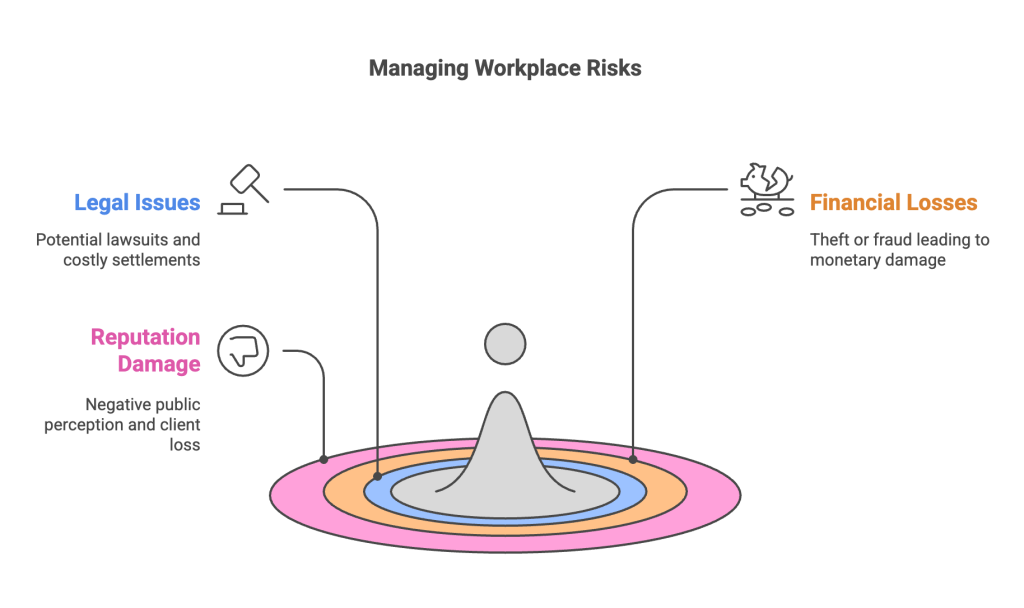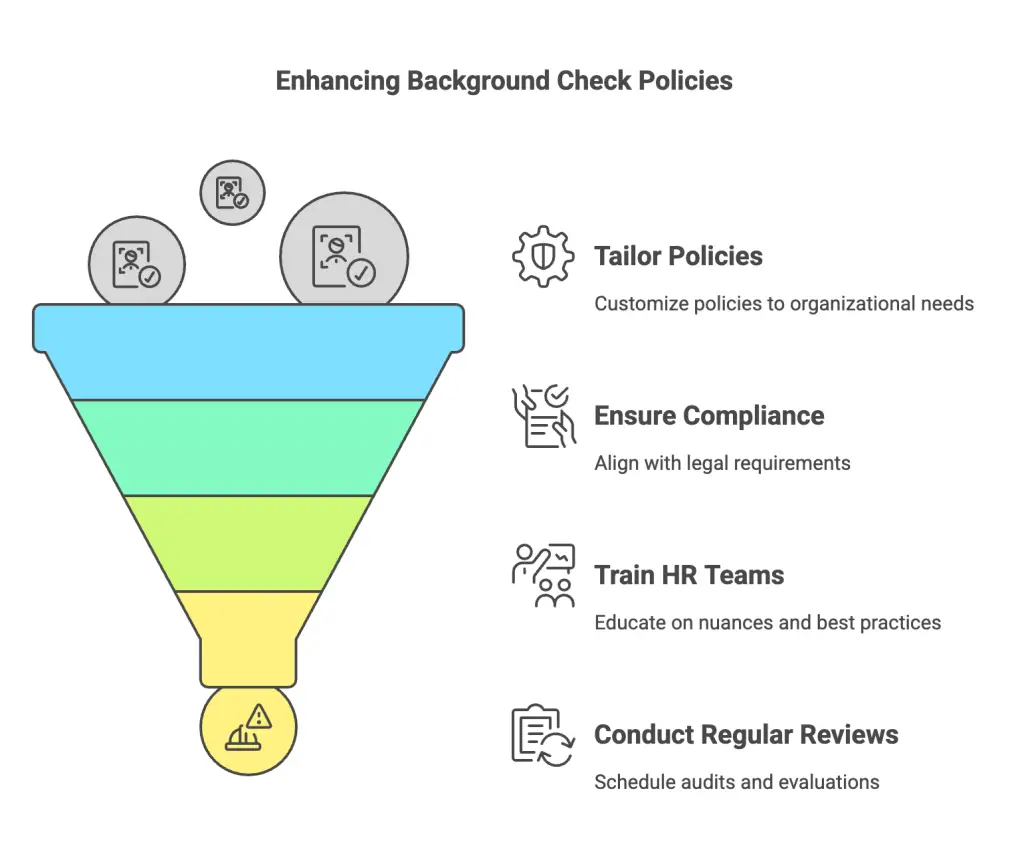In today's fast-paced and ever-evolving job market, Georgia employers face numerous challenges in maintaining a safe and efficient workplace. Proper hiring decisions are pivotal not just for productivity, but also in reducing the overall risk within the organization. This guide will walk through the key strategies, insights, and best practices for using background checks to mitigate workplace risk effectively. We'll explore legal considerations, delve into the social and technological aspects, and provide actionable solutions for building a safety-first hiring strategy.
Key Takeaways
- Background checks are essential in helping Georgia employers minimize workplace risks by ensuring candidates fit the organization's safety and culture standards.
- Workplace risks include safety violations and misconduct, and effective background checks can help identify potential threats early.
- Understanding Georgia's legal framework helps employers stay compliant with laws like the Fair Credit Reporting Act and EEOC guidelines, which are crucial when conducting background checks.
- Fair and transparent screening processes help avoid discrimination and support diversity and inclusion goals in hiring.
- Embracing technological advancements such as integrated software and AI can enhance the efficiency and accuracy of background checks while maintaining data security.
Introduction
Hiring the right people is crucial for Georgia employers aiming to minimize risk. Background checks provide a foundational tool in this process. They are not just about identifying red flags; they're about ensuring a fit with the organizational culture and values.
Background checks help you avoid hiring pitfalls by offering a clear view of candidates' histories. This can include their past employment performance, criminal records, and more. Workplace risks accompany any hiring decision, ranging from potential misconduct to liability issues. A comprehensive approach using background checks can preemptively address these concerns.
This article serves to guide you through employing these checks as a multi-faceted solution to various workplace risks. With an emphasis on practical strategies, you can build a safety-first hiring strategy tailored to the unique demands of the Georgia business environment.
Understanding Workplace Risks

Workplace risks come in many forms. They can range from minor safety violations to severe cases of employee misconduct. For example, an employee with previous incidents of violence poses a safety concern. Similarly, someone with a history of fraudulent activities could endanger financial integrity.
These risks have real consequences. Legal issues can arise, leading to costly settlements. Financial losses can occur through theft or fraud. Reputation damage is another significant impact, potentially affecting your business's standing in the industry. Customers and clients tend to steer away from companies with unsafe or unethical practices.
Your role in managing these risks is crucial. Recognizing potential threats early can prevent bigger problems. Have you considered what unchecked risks might be hiding within your workforce? Can you afford not to know?
Effective background checks help control these uncertainties. They act as your first defense against potential harm. By doing so, they allow you to make informed and responsible hiring decisions. As you navigate this process, think about how each risk, if unmanaged, could affect your business. Make it a priority to mitigate such risks for a safer, more stable work environment.
The Role of Background Checks in Risk Mitigation
Background checks serve as a gatekeeper in hiring processes. They help filter out candidates who might pose a risk to workplace safety and compliance.
Criminal record checks are among the most common types of screenings. These checks can identify past behavior that may signal potential threats to your organization. They can reveal convictions that could indicate a risk of theft, violence, or other misconduct. By reviewing criminal histories, you can make informed decisions that protect your workplace.
Employment verification is another crucial component. It involves confirming the accuracy of a candidate’s work history. This ensures the candidate’s honesty and the relevance of their experience. Verifying employment history can prevent hiring someone who may have exaggerated or falsified their credentials.
Drug testing is also a key aspect of employee screening. Georgia has specific guidelines for how these tests should be conducted. Following these guidelines can help you implement drug testing effectively. This step can prevent potential issues related to substance abuse, enhancing overall workplace safety.
Adopting these checks can safeguard your organization. They help keep your workplace secure and compliant, further minimizing risks.
Legal Framework and HR Compliance in Georgia
In Georgia, the legal landscape for background checks is shaped by both state and federal laws. Understanding these regulations is crucial for employers who want to mitigate workplace risk while staying compliant.
Georgia employers must navigate the Fair Credit Reporting Act (FCRA), which sets the standards for background checks performed by third-party agencies. You'll need to provide clear disclosure and obtain written consent from applicants before conducting checks. Failure to adhere can lead to legal repercussions.
On the state level, Georgia doesn’t have a “ban the box” law, but local governments like Atlanta do. If you’re hiring within such jurisdictions, be mindful of these variations. Ensure that your application processes align with local laws to avoid legal pitfalls.
Georgia’s employment laws also require compliance with the Equal Employment Opportunity Commission (EEOC) guidelines to prevent discrimination. When using background check results, apply consistent and objective criteria. Avoid practices that could lead to disparate treatment or impact.
Balance thoroughness with fairness. Only request information relevant to the job role. For instance, credit history might be pertinent for a position handling finances but not for others. Consider, too, how certain information, like criminal history, impacts marginalized communities.
HR compliance involves staying updated on these laws and best practices. Regular training for HR teams is essential. This can prevent unintentional violations and promote fair hiring practices.
Do your current processes meet Georgia’s legal standards? How might changes in these regulations affect your HR strategies? Reflect on these questions to ensure your compliance efforts remain robust.
By understanding Georgia's legal landscape, you can create a compliant, fair, and effective background check process. This not only reduces risk but also fosters a more equitable workplace.
Social Considerations and Fair Practices
Ensuring that your background screening is both effective and fair is crucial. This balance safeguards not only your company but also fosters trust with potential employees.
Start by confirming that your background check processes do not inadvertently discriminate. Focus on assessing the relevance of past information to the position in question. For instance, a minor misdemeanor from years ago may not be pertinent to a customer service role today.
Transparency plays a vital role in this process. Make sure job candidates are fully aware of what your screening involves. Clearly explain why certain checks are necessary and how they influence hiring decisions. This approach not only builds trust but also sets expectations from the outset.
Consider the potential impact on your diversity and inclusion goals. Overly stringent checks can deter qualified candidates from diverse backgrounds. Tailor your screening to align with your company's values, taking into account the potential for unconscious bias.
Think about how background checks fit within your broader hiring policies. Are you consistently reevaluating these practices to ensure they serve your diversity goals? Regular reviews can help uncover blind spots and refine approaches to be more inclusive.
In short, thoughtful and fair screening processes are essential. They protect your business while ensuring you don't miss out on talent that could enhance your team. How will you make sure your background checks are fair and equitable?
Technological Dimensions and Trends
Background screening is evolving with technology, enhancing both accuracy and speed. One key trend is the use of integrated software platforms. These systems streamline data collection, making it easier for HR teams to pull reports from various databases and verify information quickly.
AI and machine learning are also reshaping the landscape. They help in reducing manual errors and introducing efficiencies in large-scale hiring processes. By analyzing data patterns, AI can flag inconsistencies or areas requiring further human review. However, relying on AI must be balanced with oversight to prevent potential biases in algorithms.
Another critical aspect is data security. As employers collect sensitive information about candidates, protecting this data is paramount. Robust encryption and secure access protocols ensure compliance with data protection laws, such as the CCPA and GDPR, providing peace of mind to both employers and applicants.
Incorporating these technological advancements can transform how background checks are conducted, allowing for more precise and fair evaluations. Are you making the most of these tools in your hiring strategy?
Actionable Takeaways for Employers

Developing effective background check policies is essential. Start by tailoring policies specific to your organization’s needs. Make sure these policies comply with both state and federal laws. Consistent application helps maintain fairness and legal compliance.
Training HR teams is vital. Equip them with the knowledge to understand the nuances of background checks and risk management. Offer regular training sessions to keep them updated on legal changes and emerging best practices. This prepares your team to handle screenings accurately and fairly.
Regularly review your background check processes. The legal and social landscapes change frequently. Set up a schedule for periodic audits and evaluations of your procedures. Update practices as necessary to reflect new standards, ensuring ongoing compliance and fairness.
Think of these measures as building blocks for a robust risk mitigation strategy. The more proactive and informed your approach, the more effectively you can manage workplace risks through background checks. Are your current policies up to the task? Consider these steps as a pathway to improvement.
Building a Culture of Safety and Trust
Your organization’s safety doesn’t just depend on policies; it relies on the people you hire. Background checks are more than just a formality. They’re a vital part of building a trustworthy team.
In Georgia, using background checks effectively enhances workplace safety. When employees know that everyone goes through a thorough vetting, it builds confidence in their peers.
Integrating background checks with workplace safety policies strengthens your risk management strategy. It ensures individuals with a history of risky behaviors do not slip through the cracks.
Think of your hiring practices as the front line of risk management. Background checks help prevent potential problems before they start.
By creating a culture where safety is prioritized, you send a clear message: every employee's well-being is important.
Are your background check processes updated to reflect this commitment? If not, consider revising them to reinforce a safe and trusted workplace environment.
Conclusion
Recapping the key points, background checks are an essential tool for mitigating workplace risks. They help ensure safer hiring by filtering candidates who align with your organization's safety and compliance standards. Remember, thorough background checks must balance with fair hiring practices to avoid discrimination and encourage diversity.
Take proactive steps by developing clear policies, training your HR teams, and regularly reviewing your processes. The goal is to adapt to evolving legal and social standards.
Looking ahead, staying informed on emerging trends and technologies in background screening will be crucial. By refining your methods, you'll foster a safer and more productive work environment. Keep focused on integrating these practices into your overall risk management strategy.
Frequently Asked Questions (FAQs)
How do background checks improve workplace safety in Georgia?
Background checks help identify potential risks by verifying the history of applicants. They minimize the chances of hiring individuals with a problematic past, such as violent criminal records, that could endanger other employees or clients.
What screening processes are most effective for mitigating risk in Georgia?
In Georgia, a comprehensive approach combines criminal background checks, verification of employment and education history, and reference checks. These methods provide a clearer picture of an applicant's past and professional behavior.
Are criminal records the most critical aspect of workplace screening in Georgia?
While criminal records are important, they are not the only factor. Employment and education verifications, credit checks for financial positions, and reference checks also play a crucial role in assessing an applicant's suitability for a job.
How can Georgia employers ensure compliance when conducting risk mitigation?
Employers should adhere to federal laws like the Fair Credit Reporting Act (FCRA), which mandates informed consent from applicants before conducting background checks. Additionally, understanding state-specific regulations in Georgia is essential to remain compliant.
Do Georgia workplaces include drug tests as part of their risk mitigation strategy?
Yes, many workplaces in Georgia use drug testing to ensure a safe and productive work environment. This is particularly common in industries where safety is paramount, such as transportation and construction.
How can job seekers in Georgia showcase transparency during the hiring process?
Job seekers can be upfront about their past experiences and answer all questions honestly during the interview. They should also provide accurate information and offer references who can vouch for their skills and character.
What are the benefits of reference checks?
Reference checks provide insights into an applicant's work ethic, interpersonal skills, and past performance. They help confirm the applicant's qualifications and suitability for the role.
How often should background checks be updated in Georgia workplaces?
Best practice suggests regular updates, particularly for sensitive positions, to ensure ongoing safety and security. The frequency can vary based on industry requirements and the degree of risk associated with the job.
What role do education verifications play in the hiring process?
Education verifications confirm that an applicant has the credentials claimed on their resume. This ensures qualified candidates fill positions, reducing the risk of hiring unqualified individuals for critical roles.
Are social media checks part of the hiring process in Georgia?
Some employers perform social media checks to gather additional information about an applicant’s character and professional presence. However, these checks should be conducted carefully to avoid discrimination and privacy violations.
Definitions
- Background Checks - A process employers use to verify a candidate's history before hiring. These checks can include criminal records, employment history, education, and other relevant details. They help ensure workplace safety, compliance, and job fit.
- Employment Verification - The process of confirming a candidate's work history, including past job titles, dates of employment, and duties. This ensures accuracy in resumes and prevents hiring someone who misrepresented their experience.
- Workplace Risks - Potential dangers that can arise from hiring decisions, such as employee misconduct, financial fraud, or safety violations. Managing these risks protects the company legally and financially while maintaining a secure environment.
- HR Compliance
Following federal, state, and local employment laws to ensure fair hiring practices. HR compliance includes adhering to regulations like the Fair Credit Reporting Act (FCRA) and Equal Employment Opportunity Commission (EEOC) guidelines. - Drug Testing - A screening process to detect illegal or controlled substances in job applicants or employees. Employers use drug testing to promote workplace safety, prevent liability issues, and comply with industry regulations.

GCheck Editorial Team
Meet the GCheck Editorial Team, your trusted source for insightful and up-to-date information in the world of employment background checks. Committed to delivering the latest trends, best practices, and industry insights, our team is dedicated to keeping you informed.
With a passion for ensuring accuracy, compliance, and efficiency in background screening, we are your go-to experts in the field. Stay tuned for our comprehensive articles, guides, and analysis, designed to empower businesses and individuals with the knowledge they need to make informed decisions.
At GCheck, we're here to guide you through the complexities of background checks, every step of the way.





